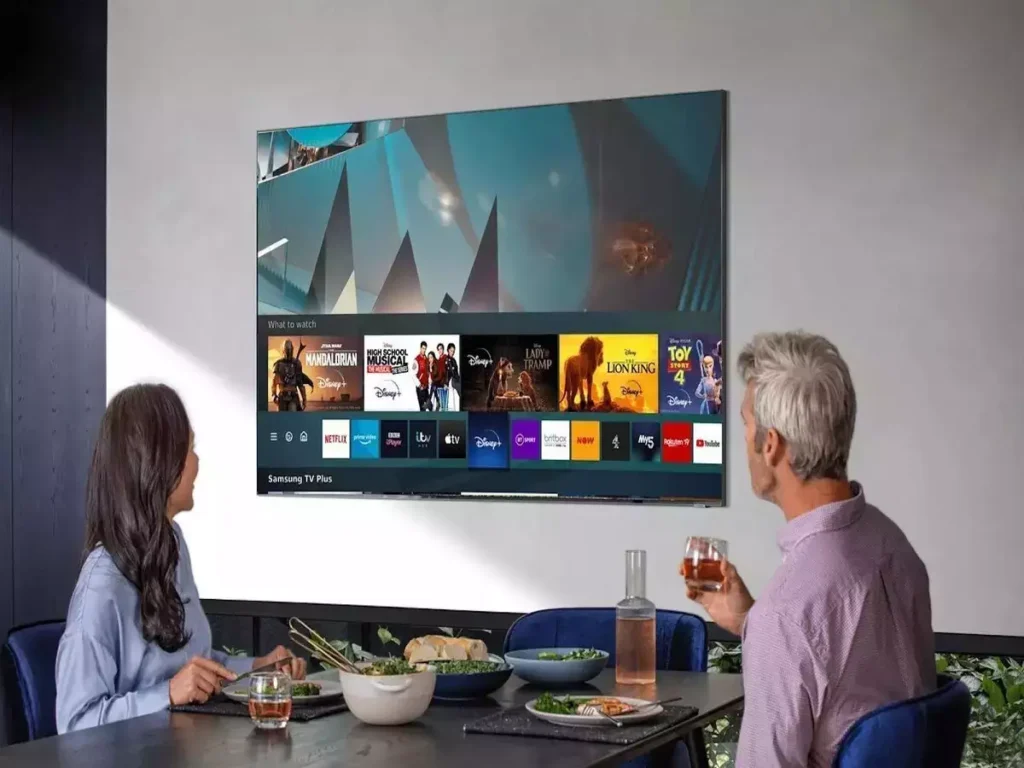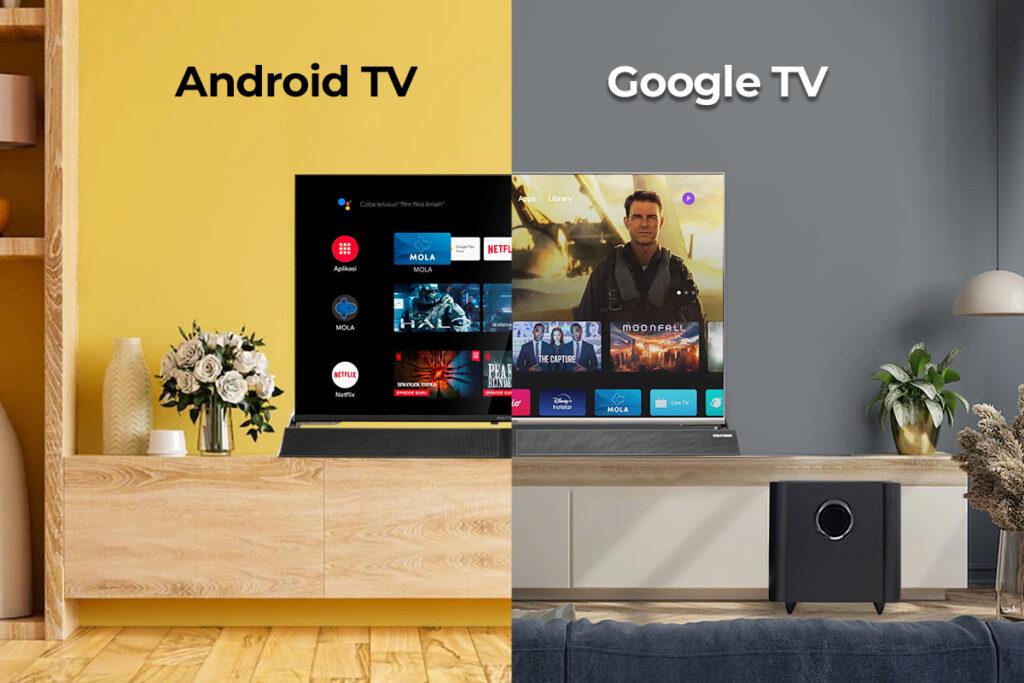In today’s fast-paced digital world, smart TVs have become a necessity. With more people ditching traditional cable for streaming, smart platforms like Android TV and Google TV are growing in popularity. If you’re confused about the fact Android TV vs Google TV, you’re not alone. While they may seem similar, they have some key distinctions. Let’s break it down in this comprehensive comparison to help you choose the right one for your needs.
What Is Android TV?
First, let’s talk about Android TV. Android TV is an operating system developed by Google. It’s been around since 2014 and is used by several TV manufacturers like Sony, Sharp, and Philips. Essentially, it turns your television into a smart device that can run apps, games, and even perform voice commands using Google Assistant.
Key Features of Android TV:
1. Google Assistant Integration: One of Android TV’s major perks is its seamless integration with Google Assistant. You can search for movies, ask questions, and control smart home devices using your voice.
2. App Support: Android TV supports a wide range of apps available through the Google Play Store. Whether it’s Netflix, Hulu, or YouTube, you’ll have no problem accessing popular streaming platforms.
3. Google Cast: With built-in Google Cast, you can cast content from your phone, tablet, or computer directly to your Android TV. This makes it easy to share videos or presentations on a bigger screen.
4. Customizable Interface: Android TV offers a customizable interface, allowing users to adjust the layout and features to fit their preferences.
5. Third-Party Device Compatibility: Android TV works well with other devices, including game consoles and external hard drives.

What Is Google TV?
Google TV, on the other hand, is a newer platform. It was first introduced in 2020 as a redesigned interface on top of Android TV. Think of Google TV as Android TV’s smarter, more user-friendly sibling. It’s more streamlined and focuses heavily on personalized content recommendations.
Key Features of Google TV:
1. Unified Interface: Google TV offers a single interface for all your streaming services. Whether you’re watching Netflix, Amazon Prime, or Disney+, the platform organizes your content in a way that’s easy to navigate.
2. Personalized Recommendations: One of the standout features of Google TV is its emphasis on personalization. Using your watch history and preferences, it curates recommendations just for you.
3. Google Assistant Integration: Like Android TV, Google TV also features Google Assistant, but with a stronger focus on voice search and smart home control.
4. Google Play Store Access: Since Google TV is essentially running on Android TV, you get access to the same library of apps in the Google Play Store.
5. Family Profiles: Google TV allows multiple user profiles, making it easy for families to have individual experiences on the same device.
6. Kids Mode: In addition to family profiles, Google TV offers a Kids Mode. Parents can set screen time limits and monitor the content their children are watching.
Android TV vs Google TV: Key Differences

Now that you know the basics of both platforms, let’s compare Android TV and Google TV in more detail.
1. User Interface
The most significant difference is the user interface. Android TV uses a more basic layout with rows of content divided into categories such as apps, games, and settings. It’s functional, but not particularly dynamic.
Google TV, on the other hand, is far more intuitive and content-driven. It puts your shows and movies front and center, curating suggestions based on your viewing habits. You don’t have to jump between apps because everything is aggregated in one place.
Winner: Google TV, for its sleek, user-friendly interface.
2. Content Discovery and Personalization
If you value content discovery, Google TV is your best bet. Its advanced recommendation engine uses machine learning to suggest shows and movies based on your history. Over time, these recommendations get better and more accurate.
While Android TV has some content recommendations, they aren’t as personalized. It’s more app-focused than content-focused, so you may need to dive into apps to find what you’re looking for.
Winner: Google TV, for its powerful content discovery and recommendation engine.
3. Performance
Both platforms are built on Android, so performance differences largely depend on the hardware you’re using. Whether you’re on an Android TV or a Google TV, the experience will be smooth on modern devices.
That said, Google TV does offer some enhancements under the hood. It feels more responsive and quick to load content compared to Android TV, especially on newer devices.
Winner: Google TV, especially on newer hardware.
4. Voice Control and Smart Home Integration
Both Android TV and Google TV come with built-in Google Assistant, so you can control your TV and smart home devices using voice commands. However, Google TV takes it up a notch by offering more refined voice search capabilities and deeper integration with Google services.
For example, with Google TV, you can ask, “What should I watch tonight?” and get personalized recommendations, something Android TV lacks.
Winner: Google TV, for its superior voice search and smart home features.
5. Content Aggregation
A key feature of Google TV is its content aggregation. Rather than opening individual apps, Google TV collects your shows and movies from various streaming services and presents them in one easy-to-navigate interface. Android TV doesn’t offer this level of aggregation, forcing users to switch between apps more frequently.
Winner: Google TV, for making it easier to find content across multiple platforms.
6. Device Support and Availability
Android TV is available on a wide range of devices, including smart TVs, streaming sticks, and set-top boxes. You’ll find Android TV powering many devices from brands like Sony, Nvidia, and Xiaomi.
Google TV is newer, so it’s not as widely adopted yet. However, Google TV is currently available on Chromecast with Google TV and some new smart TVs from brands like Sony and TCL.
Winner: Android TV, for being available on more devices.
7. Kids Mode and Family Profiles
When it comes to family-friendly features, Google TV shines. With its dedicated Kids Mode and family profiles, it allows parents to control what content their children can access and set up separate profiles for each family member.
Android TV doesn’t offer these features, making it less suitable for households with multiple users or children.
Winner: Google TV, for its family-friendly features.
8. Price and Affordability
Android TV-powered devices are generally more affordable. You can find Android TV on budget-friendly options like the Mi Box S and Nvidia Shield. Google TV is still relatively new, and while affordable options like the Chromecast with Google TV exist, its availability is more limited.
Winner: Android TV, for offering more affordable and varied device options.
Which Should You Choose?
If you’re deciding between Android TV and Google TV, your choice will depend on your needs.
– Go with Android TV if you want a basic smart TV experience, more control over app usage, and a budget-friendly device. It’s reliable, easy to use, and works with a wide range of devices.
– Choose Google TV if you prefer a content-first approach, advanced personalization, and a more modern interface. Its focus on ease of use, family-friendly features, and enhanced voice control makes it perfect for households that rely on streaming services.
Conclusion
In the Android TV vs Google TV battle, Google TV is the more polished, feature-rich option. Its focus on content discovery, personalization, and ease of use makes it the better choice for most users. However, Android TV still holds its own by offering more device options at various price points.
Both platforms are great, but if you’re in the market for a new device and don’t mind spending a bit more, Google TV is the future of smart television. Still, Android TV continues to be a solid option for those seeking simplicity and affordability.